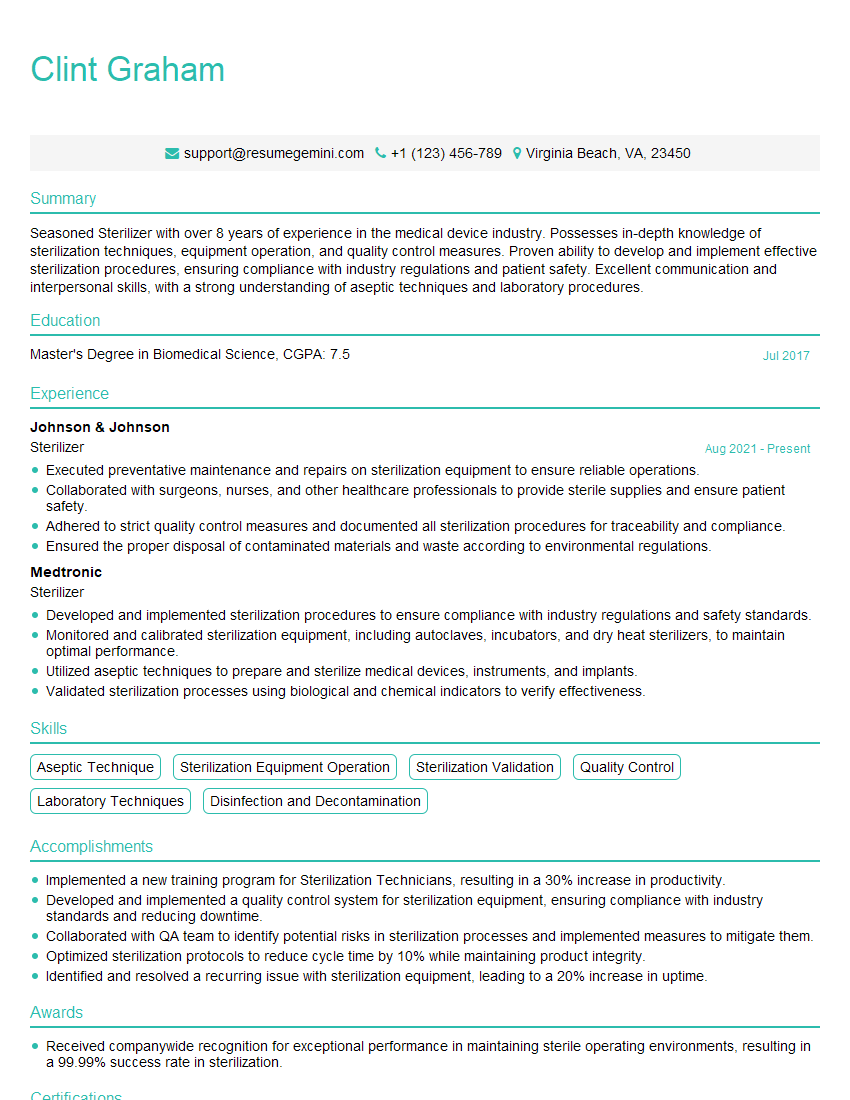Are you a seasoned Sterilizer seeking a new career path? Discover our professionally built Sterilizer Resume Template. This time-saving tool provides a solid foundation for your job search. Simply click “Edit Resume” to customize it with your unique experiences and achievements. Customize fonts and colors to match your personal style and increase your chances of landing your dream job. Explore more Resume Templates for additional options.

Clint Graham
Sterilizer
Summary
Seasoned Sterilizer with over 8 years of experience in the medical device industry. Possesses in-depth knowledge of sterilization techniques, equipment operation, and quality control measures. Proven ability to develop and implement effective sterilization procedures, ensuring compliance with industry regulations and patient safety. Excellent communication and interpersonal skills, with a strong understanding of aseptic techniques and laboratory procedures.
Education
Master’s Degree in Biomedical Science
July 2017
Skills
- Aseptic Technique
- Sterilization Equipment Operation
- Sterilization Validation
- Quality Control
- Laboratory Techniques
- Disinfection and Decontamination
Work Experience
Sterilizer
- Executed preventative maintenance and repairs on sterilization equipment to ensure reliable operations.
- Collaborated with surgeons, nurses, and other healthcare professionals to provide sterile supplies and ensure patient safety.
- Adhered to strict quality control measures and documented all sterilization procedures for traceability and compliance.
- Ensured the proper disposal of contaminated materials and waste according to environmental regulations.
Sterilizer
- Developed and implemented sterilization procedures to ensure compliance with industry regulations and safety standards.
- Monitored and calibrated sterilization equipment, including autoclaves, incubators, and dry heat sterilizers, to maintain optimal performance.
- Utilized aseptic techniques to prepare and sterilize medical devices, instruments, and implants.
- Validated sterilization processes using biological and chemical indicators to verify effectiveness.
Accomplishments
- Implemented a new training program for Sterilization Technicians, resulting in a 30% increase in productivity.
- Developed and implemented a quality control system for sterilization equipment, ensuring compliance with industry standards and reducing downtime.
- Collaborated with QA team to identify potential risks in sterilization processes and implemented measures to mitigate them.
- Optimized sterilization protocols to reduce cycle time by 10% while maintaining product integrity.
- Identified and resolved a recurring issue with sterilization equipment, leading to a 20% increase in uptime.
Awards
- Received companywide recognition for exceptional performance in maintaining sterile operating environments, resulting in a 99.99% success rate in sterilization.
Certificates
- Certified Sterile Processing Technician (CSPT)
- Certified Central Service Technician (CCST)
- American Board for Sterile Processing (ABSP)
- International Association of Surgical Technologists (IAST)
Career Expert Tips:
- Select the ideal resume template to showcase your professional experience effectively.
- Master the art of resume writing to highlight your unique qualifications and achievements.
- Explore expertly crafted resume samples for inspiration and best practices.
- Build your best resume for free this new year with ResumeGemini. Enjoy exclusive discounts on ATS optimized resume templates.
How To Write Resume For Sterilizer
- Highlight your technical skills and knowledge of sterilization techniques.
- Showcase your experience in developing and implementing sterilization procedures.
- Emphasize your understanding of quality control measures and regulatory compliance.
- Demonstrate your ability to work effectively in a team environment.
- Consider obtaining additional certifications in sterilization or related fields.
Essential Experience Highlights for a Strong Sterilizer Resume
- Developed and implemented sterilization procedures to ensure compliance with industry regulations and safety standards.
- Monitored and calibrated sterilization equipment, including autoclaves, incubators, and dry heat sterilizers, to maintain optimal performance.
- Utilized aseptic techniques to prepare and sterilize medical devices, instruments, and implants.
- Validated sterilization processes using biological and chemical indicators to verify effectiveness.
- Executed preventative maintenance and repairs on sterilization equipment to ensure reliable operations.
- Collaborated with surgeons, nurses, and other healthcare professionals to provide sterile supplies and ensure patient safety.
- Ensured the proper disposal of contaminated materials and waste according to environmental regulations.
Frequently Asked Questions (FAQ’s) For Sterilizer
What is the primary role of a Sterilizer?
A Sterilizer’s primary role is to ensure the sterility and safety of medical devices, instruments, and implants through the implementation and monitoring of sterilization procedures.
What are the key skills required for a Sterilizer?
Key skills for a Sterilizer include aseptic technique, sterilization equipment operation, sterilization validation, quality control, laboratory techniques, and disinfection and decontamination.
What are the different types of sterilization methods?
Common sterilization methods include steam sterilization (autoclaving), dry heat sterilization, ethylene oxide gas sterilization, and radiation sterilization.
What are the industry regulations and standards that Sterilizers must adhere to?
Sterilizers must adhere to industry regulations and standards such as ISO 13485, ISO 11137, and FDA guidelines.
What is the importance of quality control in sterilization?
Quality control is crucial in sterilization to ensure the effectiveness and reliability of sterilization processes, preventing the risk of contamination and ensuring patient safety.
What is the role of biological and chemical indicators in sterilization validation?
Biological and chemical indicators are used to validate the effectiveness of sterilization processes by monitoring the presence of microorganisms or chemical changes during the sterilization cycle.
How can Sterilizers contribute to infection prevention?
Sterilizers play a vital role in infection prevention by ensuring the sterility of medical devices and supplies, preventing the transmission of microorganisms and safeguarding patient health.
What are the career advancement opportunities for Sterilizers?
Sterilizers with experience and additional qualifications can advance to roles such as Sterilization Manager, Quality Assurance Specialist, or Regulatory Affairs Specialist.